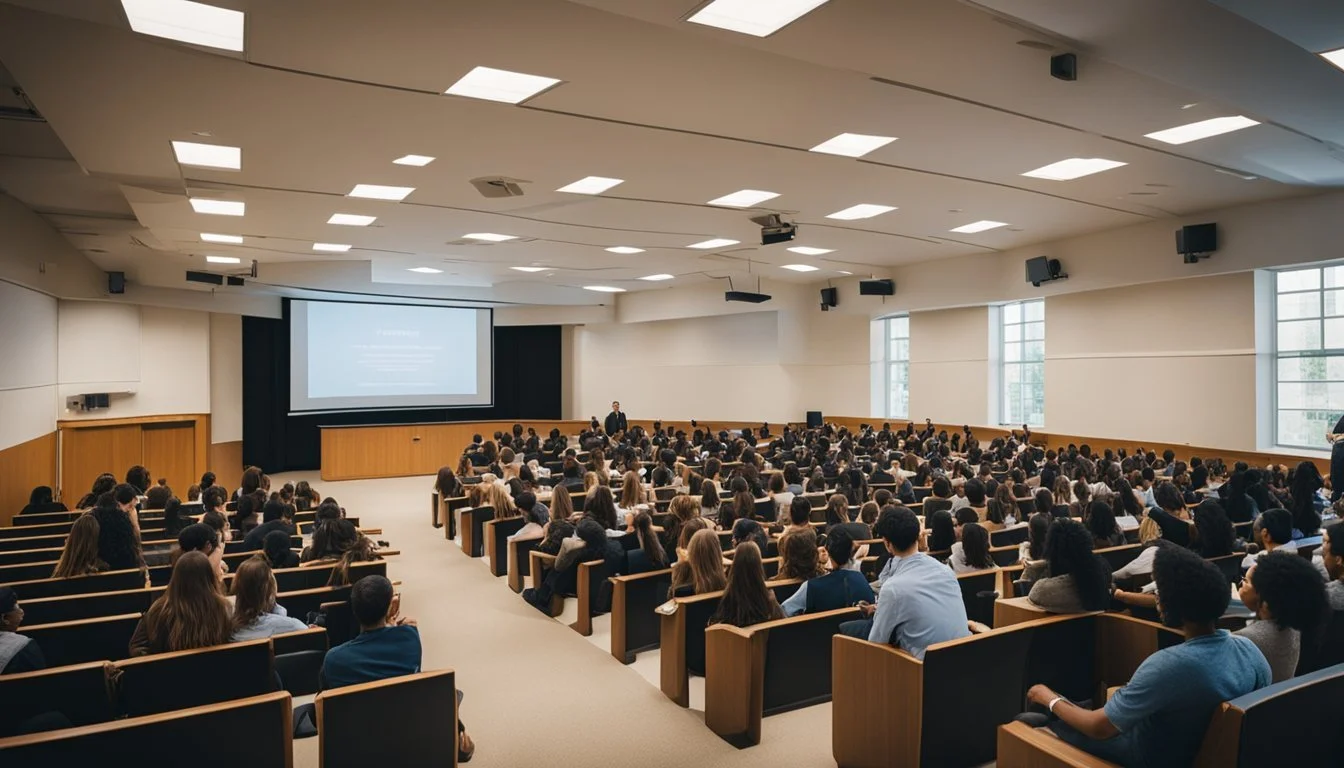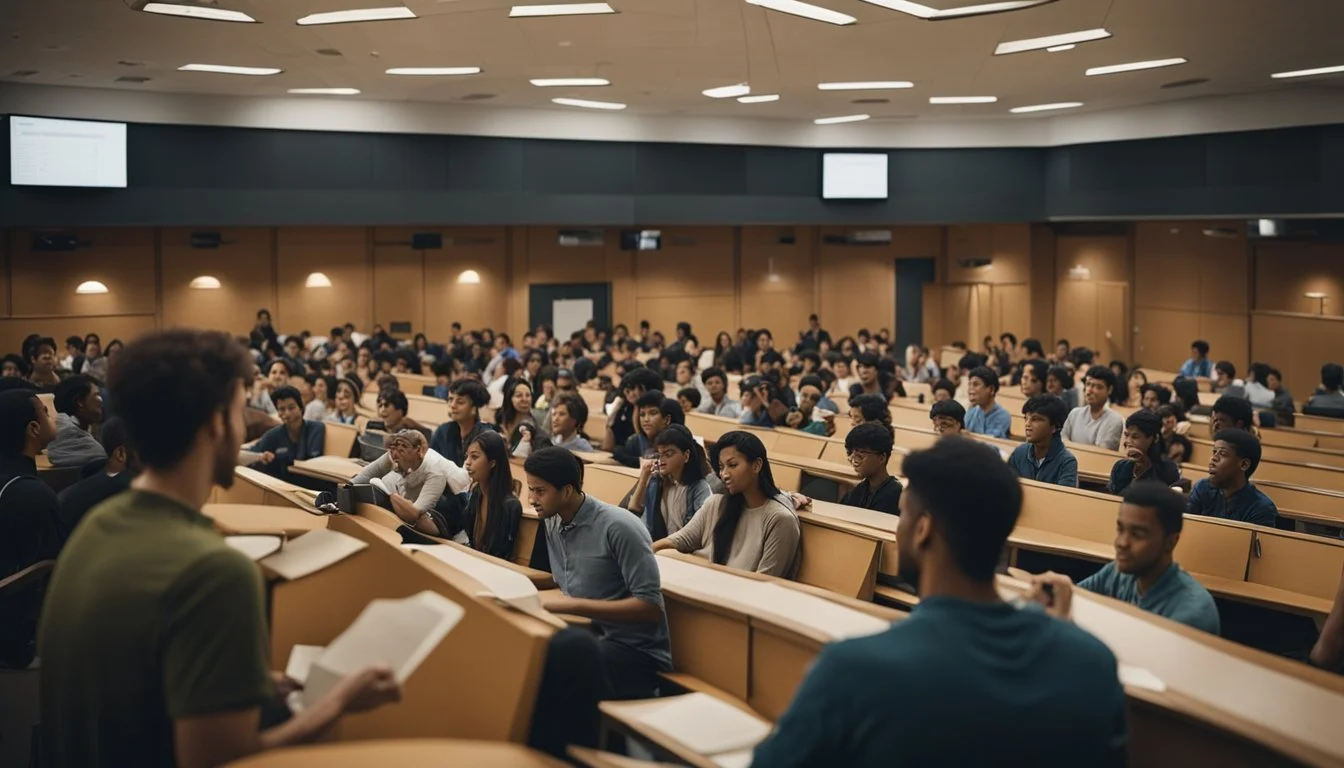Andrew Rossi: Examining the Institutions Shaping Modern Society
Andrew Rossi has meticulously explored the various institutions that profoundly shape our daily lives, shedding light on their influence and significance. His work delves into the structures of education, family, politics, and the economy, examining how these entities organize our social world and impact individual experiences. By breaking down the often invisible frameworks within which we operate, Rossi provides invaluable insights into the mechanisms that govern social behavior and societal norms.
His investigations are rooted in an understanding that these institutions are not static; they are continuously constructed and reconstructed through human actions and interactions. This dynamic perspective reveals the potential for change and reform within these foundational structures. Readers will find Rossi's analysis both enlightening and thought-provoking as he challenges conventional views and encourages a deeper comprehension of the social constructs that define our lives.
Andrew Rossi: A Brief Biography
Andrew Rossi is a celebrated filmmaker whose work primarily centers around examining cultural figures and institutions. His distinct narrative style combines factual storytelling with a nuanced exploration of his subjects' personal lives. His background and career reflect a deep commitment to impactful documentary filmmaking.
Early Life and Education
Andrew Rossi's early life set the foundation for his career in filmmaking. While specific details about his youth are limited, it is known that he pursued higher education with a focus on film and media. He graduated from Yale University, a prestigious institution that likely provided him with a strong network and the resources to advance in his chosen field.
Career Highlights
Rossi's career is marked by significant works that have garnered critical acclaim. He founded Abstract Productions, a company dedicated to producing film and television. Notably, he directed "Page One: Inside the New York Times," which premiered at the Sundance Film Festival in 2011.
His more recent work includes the 2022 Netflix series "The Andy Warhol Diaries," which earned him three Emmy nominations for writing, directing, and executive producing. These projects underscore his ability to tackle complex subjects and present them in compelling ways.
Influence in Documentary Filmmaking
Andrew Rossi has made a substantial impact on documentary filmmaking. His work often blends scripted recreations with non-fiction elements, creating a unique viewing experience. The "Andy Warhol Diaries" exemplifies this technique, offering a deep dive into the life of the iconic artist through an innovative narrative structure.
Rossi's documentaries are known for their thorough research and powerful storytelling. His focus on revealing the intricate details of his subjects' lives helps viewers gain a deeper understanding of influential cultural figures and the environments that shape them.
Institutional Analysis Through Film
Andrew Rossi utilizes the medium of film to dissect various institutions that shape societal norms and individual lives. His works provide insightful commentary on educational systems, media and journalism, and the legal system.
Examining Educational Systems
Rossi’s films highlight the intricate dynamics within educational systems. In "Ivory Tower," he examines issues such as escalating tuition fees and student debt. The documentary delves into how administrative decisions and policies disproportionately impact students and faculty.
Rossi's approach demystifies the strategies institutions employ to maintain their status quo. Ivory Tower serves as a critical lens through which viewers can explore the commodification of higher education and the challenges to educational access and equity.
Media and Journalism in Focus
In "Page One: Inside the New York Times," Rossi scrutinizes the role of journalism amidst evolving digital landscapes. The documentary presents a detailed exploration of how traditional print media grapples with challenges posed by digital news platforms.
Through interviews and newsroom footage, Rossi unveils the behind-the-scenes decision-making processes. The film underscores the importance of investigative journalism and its role in maintaining democratic accountability. This provides viewers with a comprehensive understanding of media institutions adapting to technological shifts.
The Legal System on Screen
Rossi's exploration extends to the legal system, although less explicitly compared to his documentaries on education and media. Elements of institutional analysis appear in films that address the procedural aspects and social impact of legal decisions.
For instance, Rossi’s narrative often interrogates how legal frameworks influence public perceptions and individual lives. By focusing on court cases and legal reforms, Rossi invites viewers to question the equitability and functionality of legal institutions. This approach illuminates the broader societal implications of legal practices and their role in maintaining institutional structure.
Notable Documentaries
Andrew Rossi has created several documentaries that delve deeply into the institutions shaping modern society, particularly focusing on higher education, journalism, and cultural events.
Ivory Tower: Scrutinizing Higher Education
Andrew Rossi's documentary, Ivory Tower, explores the crisis of higher education in the United States. The film examines the skyrocketing costs of tuition, student debt, and the question of whether college remains a worthwhile investment.
Rossi interviews educators, students, and administrators from various institutions. He reveals the consequences of financial strain on both public and private universities. The animated chart showing a tuition increase of 1,120% since 1978 starkly illustrates the financial pressures impacting students and families. This documentary is especially pertinent given today's ongoing debate over the value and accessibility of higher education.
Page One: Inside The New York Times
Page One: Inside The New York Times offers an in-depth look at one of the world's leading newspapers during a time of great transformation in the media industry. This documentary grants viewers unprecedented access to the newsroom and highlights the challenges faced by print journalism.
Through candid interviews and behind-the-scenes footage, Rossi showcases the dramatic shifts within the organization, including financial pressure, the rise of digital media, and the internal dynamics among staff. Key figures, such as media columnist David Carr, provide insight into the newsroom's struggle to adapt while maintaining journalistic integrity and standards.
The First Monday in May: The Met Gala
In The First Monday in May, Rossi takes viewers behind the scenes of the Met Gala, one of fashion's most prestigious events, organized by the Metropolitan Museum of Art's Costume Institute. The film highlights the meticulous planning and creativity involved in staging the event, focusing particularly on the 2015 exhibition "China: Through The Looking Glass."
Rossi provides an insider's perspective on the collaboration between fashion industry icons, artists, and museum staff. The documentary captures the cultural and artistic significance of the Met Gala while also addressing themes of cultural appropriation and the blending of East and West in fashion. This film is a fascinating exploration of how an institution mobilizes to produce a high-profile cultural event.
Methodology and Storytelling
Andrew Rossi employs a variety of techniques to explore institutions, meticulously crafting narratives that resonate with audiences. His approach includes innovative cinematic methods, detailed narrative construction, and dynamic interviews.
Cinematic Techniques
Rossi makes extensive use of visual storytelling to engage viewers. He integrates archival footage and on-location shooting to provide authenticity.
A notable example is his documentary "Ivory Tower," which juxtaposes campus beauty with financial data to critique higher education's commercialization.
Rossi often uses slow-motion shots and close-ups to emphasize emotional moments. His montage sequences help to build a larger context while piecing together disparate stories that illuminate systemic issues.
Narrative Construction
Narrative construction is crucial in Rossi's work. He creates compelling arcs that highlight both systemic issues and personal stories.
Rossi's method often involves layering narratives. In "Page One: Inside the New York Times," he weaves together stories of journalists facing industry challenges and broader issues in media. This technique grounds institutional critiques in relatable experiences.
Rossi also employs real-time narration, allowing subjects' voices to drive the story. This approach fosters a connection between the audience and the material, enhancing the impact of the documentary.
Interviews and Subject Interaction
Rossi's interaction with subjects is integral to his methodological approach. He builds trust with interviewees, resulting in candid discussions that reveal deep insights.
He often conducts long-form interviews, allowing subjects to share detailed narratives. This technique was pivotal in "First Monday in May," where fashion industry insiders provided rich context around the Met Gala.
Rossi's respectful and immersive style encourages open dialogue. These thoughtful interactions help uncover the nuances of institutional operations and their societal impacts, providing audiences with a comprehensive understanding.
Impact and Public Reception
Andrew Rossi's work, particularly on the documentary Ivory Tower, has sparked significant discussions pertaining to the state of higher education and its broader implications. This documentary has received attention from critics and the public alike, influencing discussions on education reform and policy.
Critical Acclaim and Awards
Ivory Tower has garnered critical acclaim for its thorough examination of American higher education. Critics have praised Rossi’s ability to capture the intricate challenges universities face today.
The film received commendations for its balanced narrative and insightful interviews, one of which is with Columbia professor Andrew Delbanco. His critique on the purpose and value of higher education resonated with many. The documentary’s inclusion in film festivals added to its visibility, further enhanced by positive reviews in prominent media outlets.
Influence on Public Discourse
The release of Ivory Tower had a notable impact on public discourse concerning the cost and value of higher education. Discussions have centered around student debt, educational quality, and the financial sustainability of universities.
Rossi's work has been cited in policy discussions and educational forums. Influencers and policymakers have used insights from the documentary to argue for reforms.
This broad engagement indicates the significant role the film played in shaping contemporary conversations around education.
Contemporary Issues in Rossi's Work
Andrew Rossi's documentaries focus on critical issues affecting major institutions. His analytical approach sheds light on various challenges and transformations that stretch across higher education, media, and cultural landscapes.
The State of Higher Education
Andrew Rossi's Ivory Tower examines the rising costs and sustainability of higher education. By highlighting specific institutions, including the University of California system, Rossi questions the necessity of traditional college amid financial pressures.
He portrays how students are increasingly seen as customers rather than learners, impacting the educational experience and outcomes. Rossi's work underscores the crisis in U.S. higher education, pointing out the disparities and systemic issues that place immense financial burdens on students.
Media Evolution and the Digital Age
In Page One: Inside the New York Times, Rossi captures the transformation of the newspaper industry. The film sheds light on the impact of digital media, exploring how traditional print journalism adapts to digital advancements.
Rossi’s access to the inner workings of The New York Times reveals challenges in maintaining journalistic integrity while facing economic pressures. His work emphasizes the significance of adapting to digital trends without compromising the core values of media institutions.
Cultural Institutions in Modern Society
Rossi’s interests extend to cultural institutions, analyzing their roles and transformations. Through his investigative lens, he dissects how these entities navigate modern societal complexities. His documentaries suggest that cultural institutions are not impervious to change, often reflecting broader societal shifts and economic dynamics.
By bringing a critical eye to these institutions, Rossi provides audiences with a comprehensive perspective on their evolving functions and responsibilities.
Collaborations and Industry Relationships
Andrew Rossi's documentaries have often peeled back the layers of how institutions influence our daily lives. One significant aspect that Rossi explores is the realm of university-industry collaborations.
These collaborations facilitate the flow of knowledge between academia and the business world. Research-oriented projects, educational initiatives, and informal interactions between institutions and firms have demonstrated substantial benefits.
Examples of Collaboration Types:
Research-Oriented: Joint R&D projects, publication of white papers.
Education-Oriented: Internship programs, guest lectures.
Informal Interactions: Networking events, discussion panels.
Firms engaging in these partnerships frequently benefit from innovations that emerge from collaborative R&D efforts. Many industries, particularly those intensive in research and development, view universities as pivotal sources of external knowledge.
Benefits:
Accelerated innovation
Access to cutting-edge research
Enriched educational opportunities for students
These partnerships also influence firm innovation by fostering networks that extend beyond university relationships, including interfirm alliances, particularly in sectors like biopharmaceuticals.
Key Takeaways:
Enhanced innovation through R&D collaborations
Regulatory frameworks and organizational dimensions play a crucial role
The potential for long-term, productive relationships fortified by initial interactions
Andrew Rossi's work underscores that viewing these collaborations through a lens of long-term potentials and mutual benefits is essential. This perspective ensures that the relationships are not only productive but also sustainable over time.
Future Projects and Direction
Andrew Rossi aims to explore the intricate fabric of social institutions through future projects that combine cinematic storytelling with rigorous research. His next project is rumored to focus on education systems globally. This project will investigate how educational policies, practices, and institutions impact individual and societal outcomes.
Another anticipated project will delve into the healthcare sector. By examining various healthcare models worldwide, Rossi intends to highlight disparities and propose ways to create more equitable systems.
He also has plans to look into the evolving role of technology in shaping our daily lives. This project will analyze the growing influence of digital platforms on privacy, behavior, and social interactions.
Rossi’s future work will not be limited to a single medium. He intends to utilize documentary films, interactive web platforms, and public engagement initiatives to reach a diverse audience. This multi-faceted approach emphasizes his commitment to making complex social issues accessible and engaging.
Moreover, collaborations with social scientists and policy experts will be central. These partnerships aim to ensure that Rossi's projects are grounded in the latest research and contribute meaningfully to ongoing discussions about institutional reform.
By maintaining a clear and analytical approach, Rossi’s future projects are set to provide valuable insights into the institutions that shape our existence, encouraging public discourse and policy change.
Additional Resources and Further Reading
For those interested in diving deeper into the work of Andrew Rossi and the institutions that shape our lives, several key resources can provide valuable insights.
Books and Articles
Ivory Tower by Andrew Rossi: This documentary explores the challenges facing American higher education.
Inside Higher Ed: Offers articles and op-eds on current issues in education.
The New York Times: Frequently publishes pieces on politics, education, and religion.
Documentaries and Films
Ivory Tower (2014): Directed by Andrew Rossi, this film investigates the rising cost of college and the sustainability of higher education systems.
Page One: Inside the New York Times (2011): Another documentary by Rossi, providing a behind-the-scenes look at the newspaper industry.
Interviews and Podcasts
Collider Interview with Andrew Rossi: Offers an in-depth discussion about Rossi’s approaches and insights into higher education.
Web Exclusive Interview by Dennis West: Delves into Rossi's viewpoints on the societal impact of American education.
Online Platforms and Forums
Quizlet Chapter Summaries: Useful for understanding the broader impact of social institutions.
Academic Forums: Participate in discussions about the current trends and future of educational institutions.
Websites
Andrew Rossi's Official Website: Contains information on his projects, filmography, and upcoming works.
Education Data Initiative: Provides statistical data and research papers on the state of higher education.
These resources offer a comprehensive look at the landscape Andrew Rossi examines, enabling readers to explore the complexities of the institutions that influence daily life.








